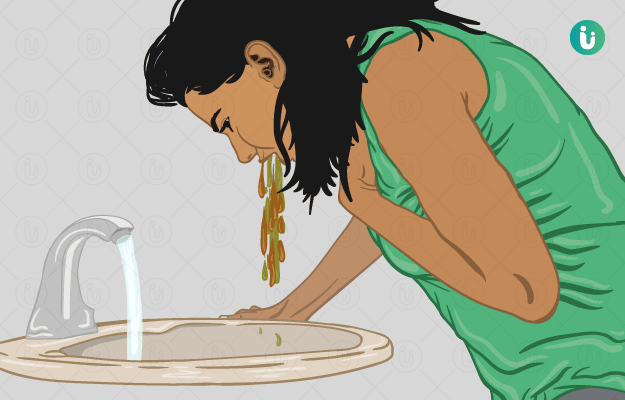What are nausea and vomiting?
Nausea and vomiting are commonly observed symptoms associated mostly with gut diseases, some conditions which are painful and side effects of some medicines. Many times, these symptoms are seen as an after-effect of general anaesthesia. Vomiting is the emptying of stomach contents through the mouth while nausea is the uneasy feeling that is experienced before vomiting. Both the conditions are treatable, and generally, they do not indicate a serious health problem.
What are its main associated signs and symptoms?
Nausea and vomiting are signs indicating some disease condition; however, the following symptoms are seen along with nausea and vomiting:
- Rapid pulse.
- Dry mouth.
- Fainting or dizziness.
- Light-headedness.
- Confusion.
- Abdominal pain.
What are the main causes?
Nausea and vomiting can be experienced due to a number of causes as follows:
- Motion sickness or seasickness.
- Stomach infection.
- Inflamed gallbladder.
- Migraine.
- Vertigo.
- Brain injury or a brain tumour.
- Stomach ulcers.
- Hyperacidity.
- The first trimester of pregnancy.
- Fear.
- Unpleasant smell.
- Eating disorders.
- Food poisoning.
- A side effect of medicines.
- General anaesthesia
- Chemotherapy and radiation therapy
How is it diagnosed and treated?
There could be a wide array of causes for nausea and vomiting, hence finding the exact cause of these symptoms will help with treating them successfully. A detailed medical and personal history helps in understanding the possible reason for the occurrence of these symptoms, and generally, other specific symptoms can suggest the underlying cause of the disease. Imaging studies, blood tests or tests for a specific disease can be carried out to find out the disease condition.
In most cases, vomiting is self-limiting and stops after the stomach contents are expelled out but sometimes treatment is required. Treatment includes taking care not only of nausea and vomiting but also treating the underlying cause. The following treatment is usually advised.
- Anti-nausea and anti-emetic drugs. If you are pregnant, you should take medication only after consulting your gynaecologist.
- Preventive anti-motion sickness medication.
- Rehydration therapy to replenish the lost fluids in the form of an oral rehydration solution or intravenous fluid infusion.
- Some natural remedies like holding a small piece of ginger or clove in the mouth can relieve you of nausea.
Taking small meals and drinking water after meals rather than with meals can help you avoid nausea. If vomiting is not controlled with medicines and persists for a long time, see your doctor without delay.

 Doctors for Nausea and Vomiting
Doctors for Nausea and Vomiting  OTC Medicines for Nausea and Vomiting
OTC Medicines for Nausea and Vomiting
 Nausea and Vomiting articles
Nausea and Vomiting articles

 Home Remedies for Nausea and Vomiting
Home Remedies for Nausea and Vomiting
 Homeopathic Treatment of Nausea and Vomiting
Homeopathic Treatment of Nausea and Vomiting







 Dr. Rachita Narsaria
Dr. Rachita Narsaria

 Dr. Laxmidutta Shukla
Dr. Laxmidutta Shukla











